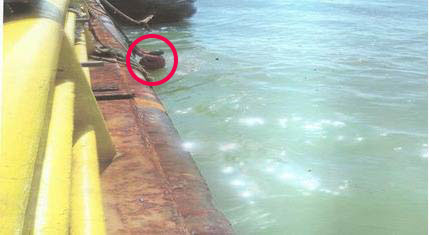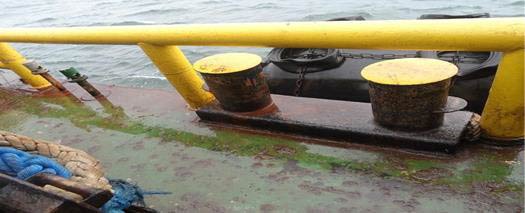Non-fatal man overboard incident
A member has reported an incident in which a crewman fell overboard during mooring operations. The incident occurred whilst an Offshore Support Vessel (OSV) was casting off from a barge after completing a delivery of groceries. Whilst retrieving the forward mooring rope from the sea (which was stuck between the forward Yokohama fender and the barge at the time), the crewman assigned to this activity lost his balance and fell into the sea. He was recovered unharmed.


Our member’s investigation revealed the following: . Before the incident: . A general tool box talk had been held on board the barge in the morning before the day’s activities – however no task specific tool box talk on mooring and unmooring of vessels was held before the operation . The mooring task was not risk assessed and risk controls were not set up and implemented;
- The man overboard was:
- Wearing full Personal Protective Equipment (PPE) including a life vest
- Known to be competent at his job and medically fit
- Known to have attended and participated in several Man Overboard (MOB) drills held on board the barge
- In the wrong place (between the space under the railings) while pulling the mooring rope to free it from the fender.
This led to his falling overboard when he lost his balance;
- The mooring rope was:
- Trapped or entangled on the Yokohama fender which was positioned directly by the fairlead
- Relatively old and fitted with a bowling eye
- Subject to further tension owing to swell conditions.
- The deck surface was not slippery at the time of incident;
- The MOB rescue:
- Nearby personnel raised alarm of MOB before throwing a life buoy with a line in the direction of the man overboard
- The man overboard pulled himself alongside the vessel (no MOB alarm was sounded from the barge)
- A small boat was immediately deployed for rescue and the man overboard was recovered after less than five minutes.
- After the incident:
- There was no immediate examination of the man overboard by the barge medic, and a drug and alcohol test did not take place immediately after the incident
- Communication of the incident to the client was not timely.
Our member’s recommendations included:
- Appropriate and full toolbox talks and risk assessment to be carried out before mooring operations;
- Improve levels of supervision for mooring operations;
- Adjust position of Yokohama fender to prevent tangling or entrapment of mooring lines;
- Review MOB drill;
- Review of mooring operations to include:
- Mooring lines under tension should be handled with utmost care, to avoid any sudden surge of weight . Mooring line should be pulled away from obstructions and kept well clear before heaving in during mooring and unmooring operations
- Vessel crew should agree before mooring line is released for pick up
- Damaged and worn out mooring lines should never be used for mooring operations;
- Fabrication and installation of mid-rails to prevent recurrence of incident;
- Post incident drug and alcohol test kits should be provided on board the barge;
- Following incidents, established emergency response protocols should always be followed.
Members may wish to refer to the following incidents (search words: MOB, overboard):
Safety Event
Published: 3 December 2015
Download: IMCA SF 20/15
IMCA Safety Flashes
Submit a Report
IMCA Safety Flashes summarise key safety matters and incidents, allowing lessons to be more easily learnt for the benefit of all. The effectiveness of the IMCA Safety Flash system depends on Members sharing information and so avoiding repeat incidents. Please consider adding safetyreports@imca-int.com to your internal distribution list for safety alerts or manually submitting information on incidents you consider may be relevant. All information is anonymised or sanitised, as appropriate.
IMCA’s store terms and conditions (https://www.imca-int.com/legal-notices/terms/) apply to all downloads from IMCA’s website, including this document.
IMCA makes every effort to ensure the accuracy and reliability of the data contained in the documents it publishes, but IMCA shall not be liable for any guidance and/or recommendation and/or statement herein contained. The information contained in this document does not fulfil or replace any individual’s or Member's legal, regulatory or other duties or obligations in respect of their operations. Individuals and Members remain solely responsible for the safe, lawful and proper conduct of their operations.
